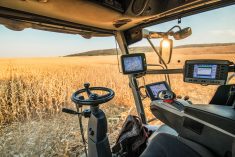Barry Todd knows what he’s going to miss most as he prepares for retirement after serving Manitoba’s agricultural sector more than three decades — the people
Manitoba Agriculture, Food and Rural initiatives’ (MAFRI) deputy minister retires March 1 after almost 32 years with the department, including the last 10 as acting and then the permanent deputy, serving three different ministers.
Todd, who turned 60 last fall, wants to spend a little more time with family. But after a break away from the pressure cooker environment in government, he hasn’t ruled out working on projects that interest him.
Read Also

Mazergroup’s Bob Mazer dies
Mazergroup’s Bob Mazer, who helped grow his family’s company into a string of farm equipment dealerships and the main dealer for New Holland machinery in Saskatchewan and Manitoba, died July 6 from cancer.
“There are always issues emerging,” Todd says.
The trick is not to get so bogged down one loses sight of the long term, he adds.
“It’s a lot like being in university every day of your life because you’re always learning something new every day, which I found to be positive, to be honest with you. I like learning and I like new things — but at the same time it is pretty constant in terms of the demands on you.”
It has meant shorter vacations, which included taking work along and never really being disconnected from the office.
“I’m thankful for an understanding family,” he says.
Todd, who has a PhD in weed science, grew up on the family farm near Harding, northwest of Brandon. He took Grades 1 through 8 in a nearby, one-room country school with the appropriate name, Education Point.
Todd liked the farm but recognized his own shortcomings.
“I’m not very good mechanically, truth be known, and when I did think about farming I thought if I can’t be good at mechanical things this isn’t going to work out very well,” he says.
But the farm also exposed Todd to science and his interest was piqued by the goings on at the Agriculture Canada Research Station at Brandon.
After graduating from the University of Manitoba in 1977, Todd joined a chemical company to co-ordinate its research. Two years later he was an assistant professor of weed science and agronomy at the University of British Columbia.
Weeds
Todd joined Manitoba Agriculture in June 1981 as a weed specialist with the Soils and Crops Branch. He became chief of the weeds section in 1987 and later branch director. In 2004, he became deputy minister of agriculture for the province.
“It has been a really interesting period… and a pleasure and a privilege to be involved in agriculture over that period of time,” he says. “Our producers, as you know, have faced lots and lots of challenges, but we have such a strong industry here in terms of producers who are innovative and resilient and change with the changing times.”
Asked about career highlights, Todd says it has been the good relationship between MAFRI, the agricultural industry and rural communities.
One of Todd’s first responsibilities as deputy was overseeing MAFRI’s reorganization. A new emphasis was placed on adding value, rural economic development as well as farm business management.
“I still think agricultural extension activities along that continuum do make a difference for our producers and for our industry, but I do think we have to keep evolving with how we work with industry on how we provide that information and those services,” he says. “The new technologies and communication methods have to be adapted and adapted quickly.”
Critical role
Despite the rise in private-sector extension services, there’s still a critical role for publicly funded extension in areas such as conservation, crop rotations and weather monitoring, which plays a role in disease and insect outbreaks, Todd said. “One of the roles of a department like ours is to really support the industry agronomists,” he said.
The annual Crop Diagnostic School, which operates in co-operation with the University of Manitoba, is open to farmers, but the bulk of the pupils are company agronomists.
Agriculture has seen a lot of ups and downs, but it has never looked brighter than now, said Todd, thanks to a growing world population and rising middle class in many poorer nations.
“When I look ahead I think the opportunities in the agri-food sector are just tremendous,” he says.
“In addition to having a really good industry in Manitoba and a really bright future I think we have excellent staff in the department that I’m just really, really proud of.
“Over this last period of time when we’ve had a lot of difficult situations hit the province I just can’t say enough good about the role that those staff have played in working with producers and their families. We tend to take them too much for granted I think.
“I take my hat off to staff that have contributed in so many ways to their client bases.”



















